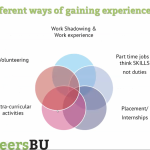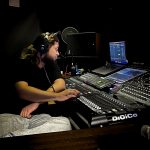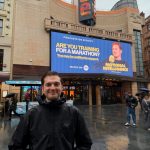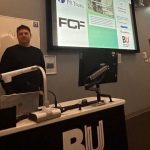 Produced by Guest blogger
Produced by Guest blogger
Hello there! My name is Emiyn, I am an MSc Biological Anthropology student here at Bournemouth University.
I wanted to talk about the Additional Learning Support offered here, as it has had a huge impact on the quality of my university experience.
I entered Bournemouth University through Clearing, so beginning my university life was hectic, emails flying into my inbox, overwhelmed with tasks to complete. I wanted to get into university so much because it was something my grandparents had always encouraged, to the point where it felt like my options were Enter University or Death By Grandmother. It led to some not so great decisions at first, panic booking private accommodation is not the way to go. Poor planning is something I’ll get to later, but something I didn’t have to worry about was exam accommodations.
I was taken into foster care at 16, which facilitated my diagnosis with depression and anxiety. Bournemouth offers excellent support for care-leavers, so if you fall into this category, there are lots of things to help you achieve your highest potential.
As I filled in the paperwork for entering the university, among them was an email from the ALS team detailing the kinds of things they helped with; I noticed mental health conditions were among the things they helped with, and so informed them of my diagnoses. During arrivals week, I met with the team and they helped me arrange accommodations for my lectures and exams. The process was painless and I felt supported along the way.
As I progressed with my University studies, I realised I was falling behind more than I had before. My time keeping was atrocious, along with my organisation, and I was becoming overwhelmed. Something was affecting me and I didn’t know how to deal with it.
I met with the ALS team again to ask what could be done. Even without any further diagnosis, they could put in place accommodations to suit me that would mitigate some of the issues I was experiencing. They helped me book onto a meeting with an educational psychologist to screen for any specific learning differences. The ALS team is fantastic they took my abstract problems like “Sorry, I can’t think too well right now, my hands are too dry” and what I now know to be hyperfixations and special interests, were able to work out coping strategies that worked for me.
In the mean time I did some research and found that my symptoms aligned with a mix of Autism Spectrum Condition and ADHD, at this point I had also been diagnosed with C-PTSD due to my childhood. Which is where the poor planning and foresight come in as these traits are found in both conditions. Both of these conditions are also underdiagnosed in those assigned female at birth. Since I fall into this category, and my upbringing, I had slipped through the net despite showing all these signs. The other caveat is that anxiety and any coping strategies that have formed in the many years up until now can mask these traits.
I received a diagnosis of ASC before my educational psychologist appointment since I had approached my GP long before the ALS team, due to my own suspicions. Through the screen by the educational psychologist I discovered I had dyspraxia and showed a high amount of ADHD traits. They couldn’t give a definitive diagnosis and I will have to be referred to another institute if I wish to pursue this, but now I have my answers and accommodations. Being able to put a name to my experiences have aided hugely in making me feel less broken and instead lead to an understanding of myself and how better to cope with my conditions.
So now with my Depression, Anxiety, C-PTSD, Dyspraxia, Autism and ADHD, I am about to graduate with a Masters in Biological Anthropology. Don’t be afraid to ask for help if things are becoming difficult. The team here at Bournemouth is excellent and you will be able to curate your university experience until it best suits you.
 My experiences of studying at BU and being hard of hearing
My experiences of studying at BU and being hard of hearing Understand the UK job market – tips from BU Career team to prepare for my future job
Understand the UK job market – tips from BU Career team to prepare for my future job How BU becomes a second home for international students
How BU becomes a second home for international students My experience with BU’s support services
My experience with BU’s support services








